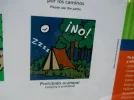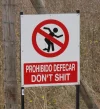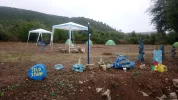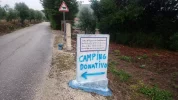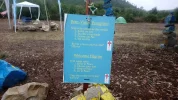good_old_shoes
Veteran Member
- Time of past OR future Camino
- Francés ('15, '19)
Via Coloniensis ('16)
Trier-Nancy + Le Puy-Fisterra ('17)
Aragonés ('18)
Buen Camino peregrinos 
Since more and more people seem to be interested in the option of sleeping in a tent on the Camino, it might be time to think about ways to make it more tent friendly. While so far it might be possible to camp if you really want to, it is not really easy, certainly not usual, and also often not seen in a very positive light (even when done legally).
This is what this thread is about. It‘s written from a tent-carrying-walker's point of view, but it would be great to get some input from those who work at albergues, too!
Despite all prejudice, I think it could be quite easy to make the Camino more tent friendly - legally, without any loss for local business, with no littering problem, and while still keeping the pilgrim spirit. In other countries, like France, it works well already.
So, let‘s collect ideas about that. Time for some brain storming! And please stay positive!
(and just so nobody will get this wrong, it‘s all assuming that the Corona situation is under control and the Camino open again for pilgrims in general)
I‘ll start, feel free to add your ideas and wishes!
1. I wish they would Include camping as a normal form of accomodation.
A similar list as the one for albergues could be created and given to pilgrims in St. Jean, but for camping only. Or the camping options could be indicated in the albergue list (for example a tent symbol).
In the official camping options list for pilgrims, you could also make it very clear that wild camping and making fire is not allowed and that it‘s obligatory to use the official options from the list.
If people had good information about where/how to legally setup camp and still meet their fellow pilgrims, there‘d probably be less attempts to wild camp. Also, that way you have all the tent pilgrims in the same spots and where they won‘t bother the locals, and they'll be in areas with bins and toilets, so that littering will not be a problem.
2. I wish camping in albergue gardens would be easier, more common, and officially welcome
Some albergues already welcome tents (thank you!), but there are probably many more that could allow camping than do so far. I guess the whole concept is just not common in Spain. In France, for example, it works very well. Information on whether gîtes allow camping is included in the guide books. It is a regular option for sleeping just like booking a bed.
You pay a fee for the night, then you can use the bathroom facilities and kitchen and still meet up with your pilgrim friends. Perfect solution for me. You get to sleep in your tent, but you‘re still part of the pilgrim community. In Spain, so far, you might feel like a second or third class pilgrim right now if you're asking for a spot for a tent... A tent!? Must be a freeloader, a hobo, or worse!
Albergues could put up a sign if they allow camping, so that tent-pilgrims know for sure where they're welcome (instead of having to ask everywhere and hope for the good will of the current hospitalero of an albergue, while the next one might change the rules and not accept tents at all). Put a price tag on it, if you want. Same price as a bed. No loss then.
Include the „tent friendly“ information in accomodation lists also.
To prevent overcrowding and unhappy bunk-bed walkers ("why are they carrying a tent and still use the albergue bathroom/kitchen instead of staying in the wild and cooking on a stove"), rules like the ones for bikes could be used. For example "tents can only check in after 5pm". That way they can't take away space from others. If there's laws that only a certain amount of people are allowed in one albergue, this way the pilgrim could pay for a bed and then just decide to sleep outside in the garden anyways. Bed is left empty, but not taken from anyone, and everybody‘s happy.
3. I wish they'd create official small pilgrim camping spots.
These don‘t really exist yet, but could be a good solution - a middle way between wild camping and official big campgrounds, and therefore between complete isolation and having to camp between noisy tourists's giant caravans - that could still be a pilgrim's meeting point.
For this, you could easily use already existing picnic areas. Those are usually outside of town, just before or after (that way the locals wouldn‘t be bothered much). They often already have benches/picnic tables, bins and sometimes even a water tap. Add a compost toilet and it should work. Then you just need a person to come by in the evening for collecting the fee that is neccessary to maintain the campsite. Or you could sell permits in town. If those spots are not too far outside town, pilgrims can still go to meet friends, for mass, for shopping, or a pilgrim‘s menu (and spend some money that the local business so desperately needs).
In Germany for example this kind of tiny semi-wild-campsites have been created a few years ago on a new hiking trail, close to the Czech republic, because there was a high demand for tent camping outside of big offical campsites by hikers (wild camping is forbidden in most parts of Germany, just like in Spain). There, you buy permits before and leave them in a box. 5 Euros per night. Max. 5 small tents per campsite, walkers only, only for one night, no fires. Compost toilet. From what I read this has been working very well so far.
These tiny campsites could be like a "camino camping municipal". Or, if there are private people interested in offering this service, the private version. Just like with albergues.
What do you think might make the Camino more tent friendly, whithout harming the way, the environment around, or the people that live along it, and while still making it feel like a pilgrimage?
What would you wish for as a tent-carrying pilgrim?
What would albergues need to be more welcoming to tents, what could we do to help?
Since more and more people seem to be interested in the option of sleeping in a tent on the Camino, it might be time to think about ways to make it more tent friendly. While so far it might be possible to camp if you really want to, it is not really easy, certainly not usual, and also often not seen in a very positive light (even when done legally).
This is what this thread is about. It‘s written from a tent-carrying-walker's point of view, but it would be great to get some input from those who work at albergues, too!
Despite all prejudice, I think it could be quite easy to make the Camino more tent friendly - legally, without any loss for local business, with no littering problem, and while still keeping the pilgrim spirit. In other countries, like France, it works well already.
So, let‘s collect ideas about that. Time for some brain storming! And please stay positive!
(and just so nobody will get this wrong, it‘s all assuming that the Corona situation is under control and the Camino open again for pilgrims in general)
I‘ll start, feel free to add your ideas and wishes!
1. I wish they would Include camping as a normal form of accomodation.
A similar list as the one for albergues could be created and given to pilgrims in St. Jean, but for camping only. Or the camping options could be indicated in the albergue list (for example a tent symbol).
In the official camping options list for pilgrims, you could also make it very clear that wild camping and making fire is not allowed and that it‘s obligatory to use the official options from the list.
If people had good information about where/how to legally setup camp and still meet their fellow pilgrims, there‘d probably be less attempts to wild camp. Also, that way you have all the tent pilgrims in the same spots and where they won‘t bother the locals, and they'll be in areas with bins and toilets, so that littering will not be a problem.
2. I wish camping in albergue gardens would be easier, more common, and officially welcome
Some albergues already welcome tents (thank you!), but there are probably many more that could allow camping than do so far. I guess the whole concept is just not common in Spain. In France, for example, it works very well. Information on whether gîtes allow camping is included in the guide books. It is a regular option for sleeping just like booking a bed.
You pay a fee for the night, then you can use the bathroom facilities and kitchen and still meet up with your pilgrim friends. Perfect solution for me. You get to sleep in your tent, but you‘re still part of the pilgrim community. In Spain, so far, you might feel like a second or third class pilgrim right now if you're asking for a spot for a tent... A tent!? Must be a freeloader, a hobo, or worse!
Albergues could put up a sign if they allow camping, so that tent-pilgrims know for sure where they're welcome (instead of having to ask everywhere and hope for the good will of the current hospitalero of an albergue, while the next one might change the rules and not accept tents at all). Put a price tag on it, if you want. Same price as a bed. No loss then.
Include the „tent friendly“ information in accomodation lists also.
To prevent overcrowding and unhappy bunk-bed walkers ("why are they carrying a tent and still use the albergue bathroom/kitchen instead of staying in the wild and cooking on a stove"), rules like the ones for bikes could be used. For example "tents can only check in after 5pm". That way they can't take away space from others. If there's laws that only a certain amount of people are allowed in one albergue, this way the pilgrim could pay for a bed and then just decide to sleep outside in the garden anyways. Bed is left empty, but not taken from anyone, and everybody‘s happy.
3. I wish they'd create official small pilgrim camping spots.
These don‘t really exist yet, but could be a good solution - a middle way between wild camping and official big campgrounds, and therefore between complete isolation and having to camp between noisy tourists's giant caravans - that could still be a pilgrim's meeting point.
For this, you could easily use already existing picnic areas. Those are usually outside of town, just before or after (that way the locals wouldn‘t be bothered much). They often already have benches/picnic tables, bins and sometimes even a water tap. Add a compost toilet and it should work. Then you just need a person to come by in the evening for collecting the fee that is neccessary to maintain the campsite. Or you could sell permits in town. If those spots are not too far outside town, pilgrims can still go to meet friends, for mass, for shopping, or a pilgrim‘s menu (and spend some money that the local business so desperately needs).
In Germany for example this kind of tiny semi-wild-campsites have been created a few years ago on a new hiking trail, close to the Czech republic, because there was a high demand for tent camping outside of big offical campsites by hikers (wild camping is forbidden in most parts of Germany, just like in Spain). There, you buy permits before and leave them in a box. 5 Euros per night. Max. 5 small tents per campsite, walkers only, only for one night, no fires. Compost toilet. From what I read this has been working very well so far.
These tiny campsites could be like a "camino camping municipal". Or, if there are private people interested in offering this service, the private version. Just like with albergues.
What do you think might make the Camino more tent friendly, whithout harming the way, the environment around, or the people that live along it, and while still making it feel like a pilgrimage?
What would you wish for as a tent-carrying pilgrim?
What would albergues need to be more welcoming to tents, what could we do to help?









